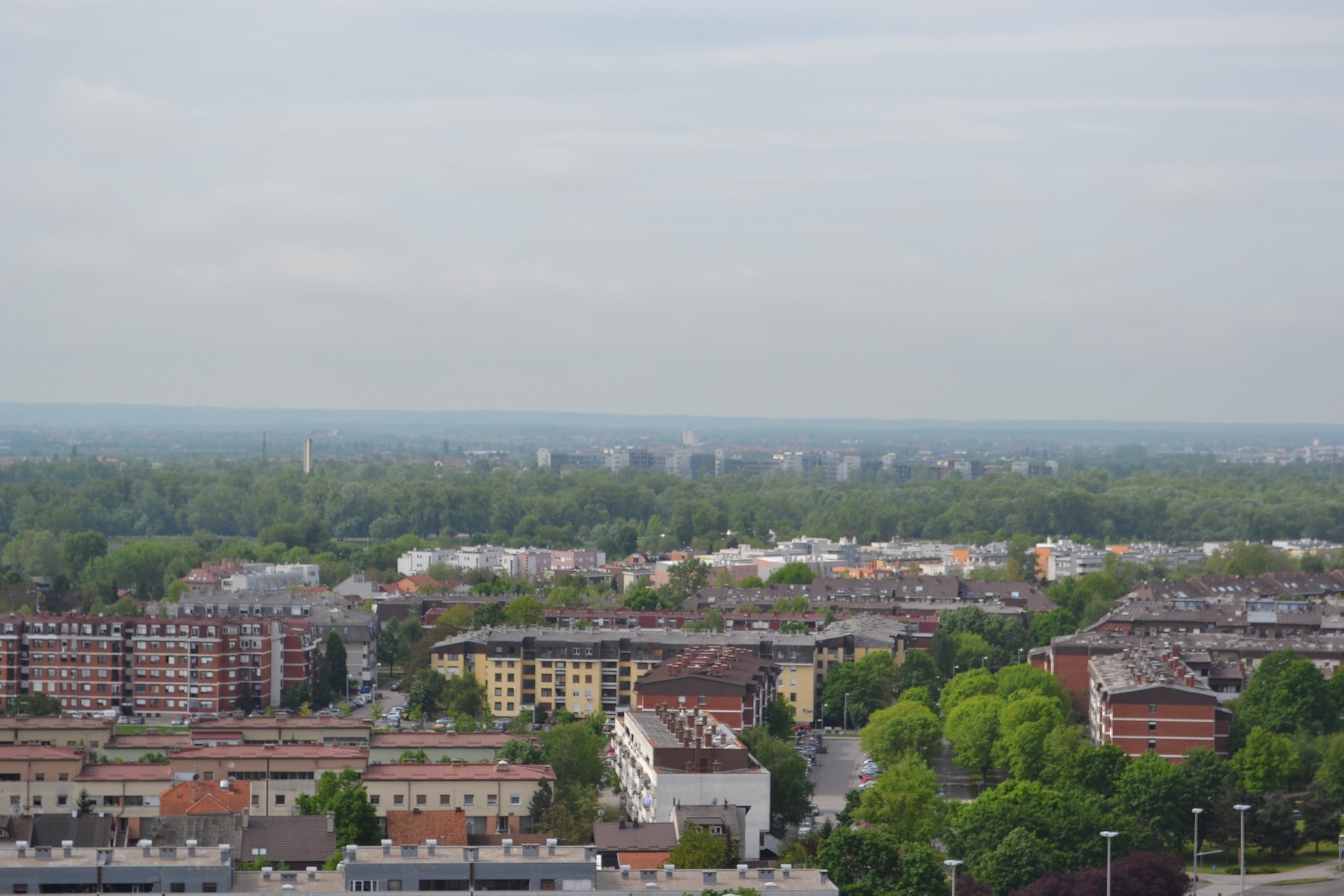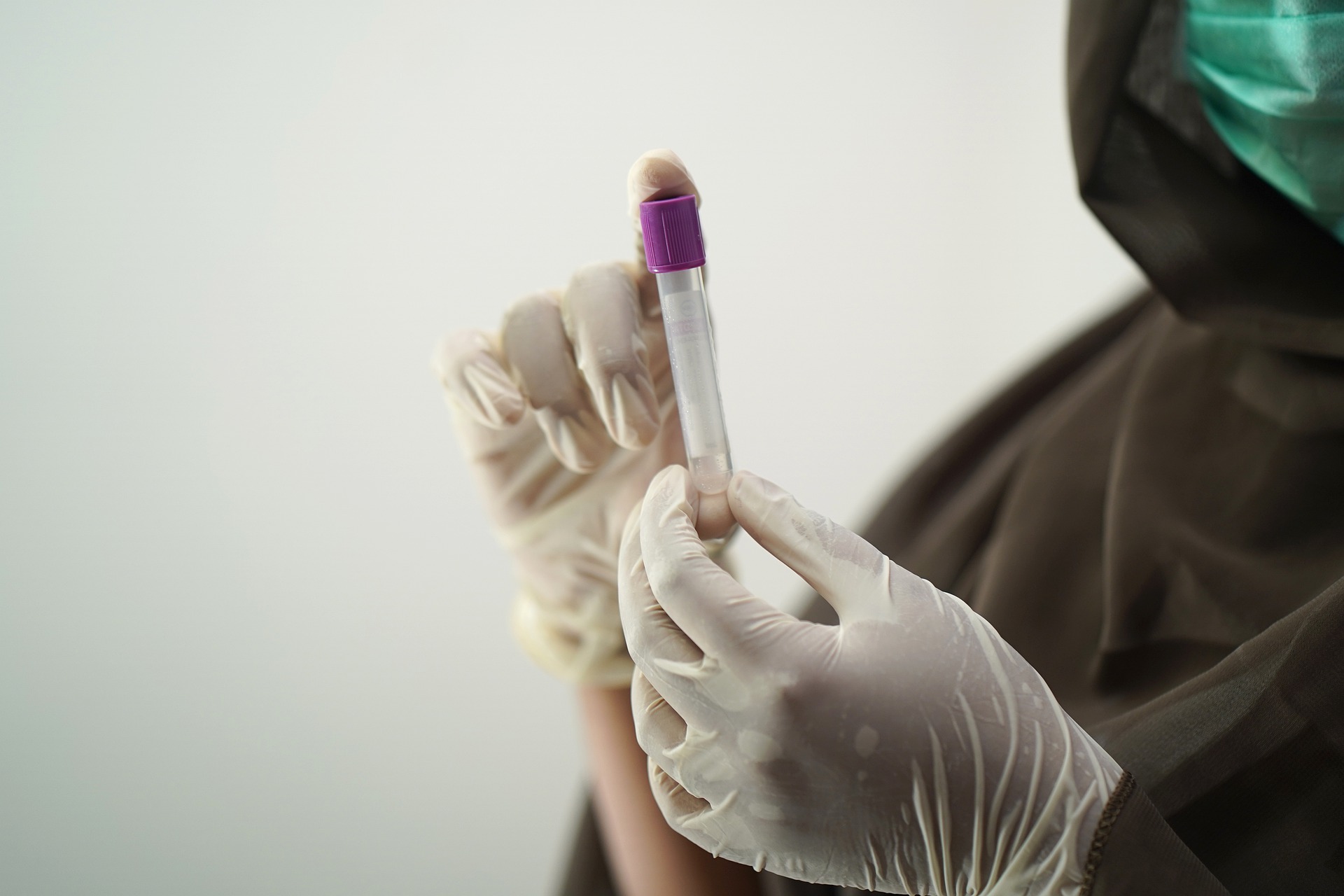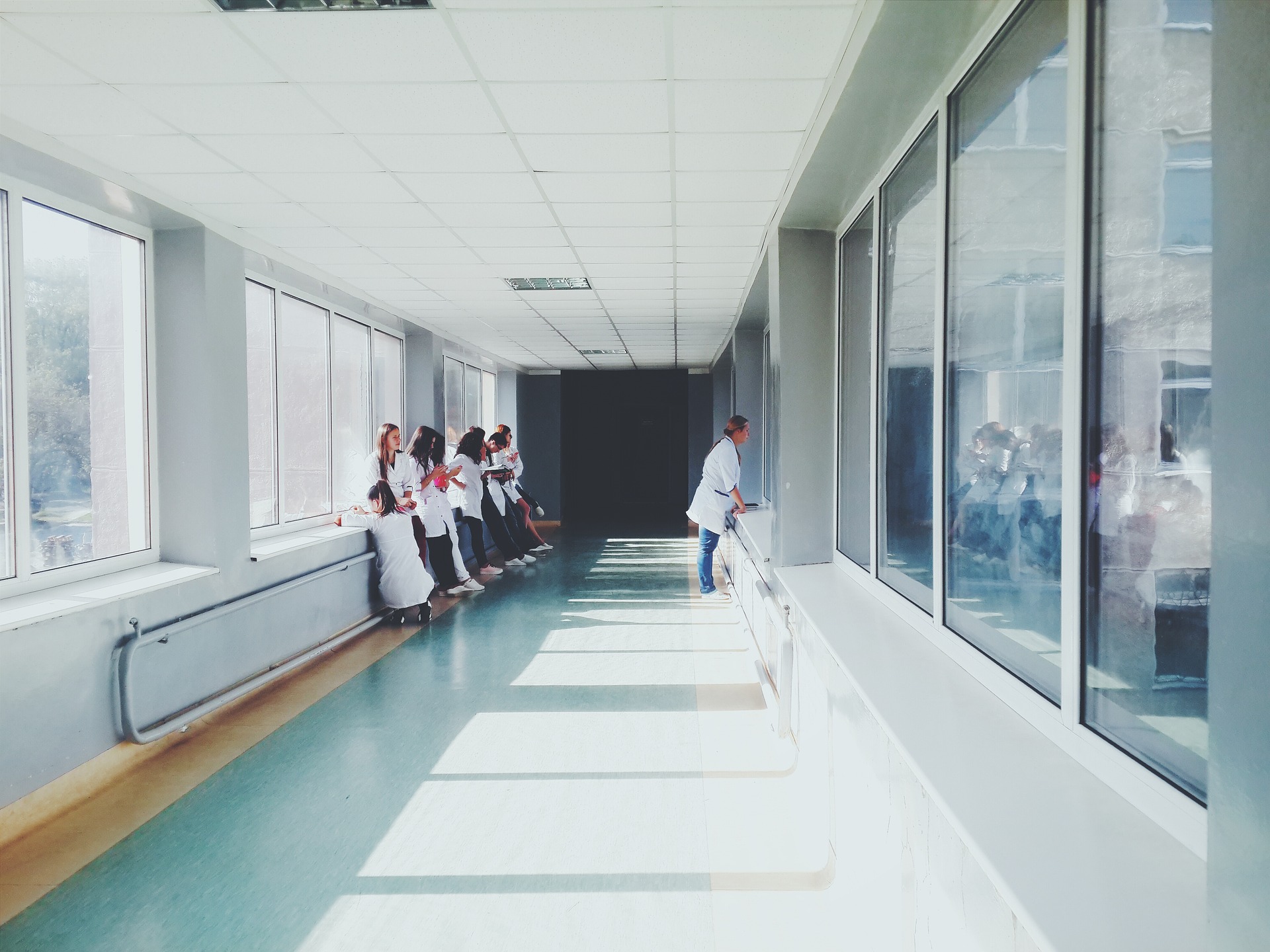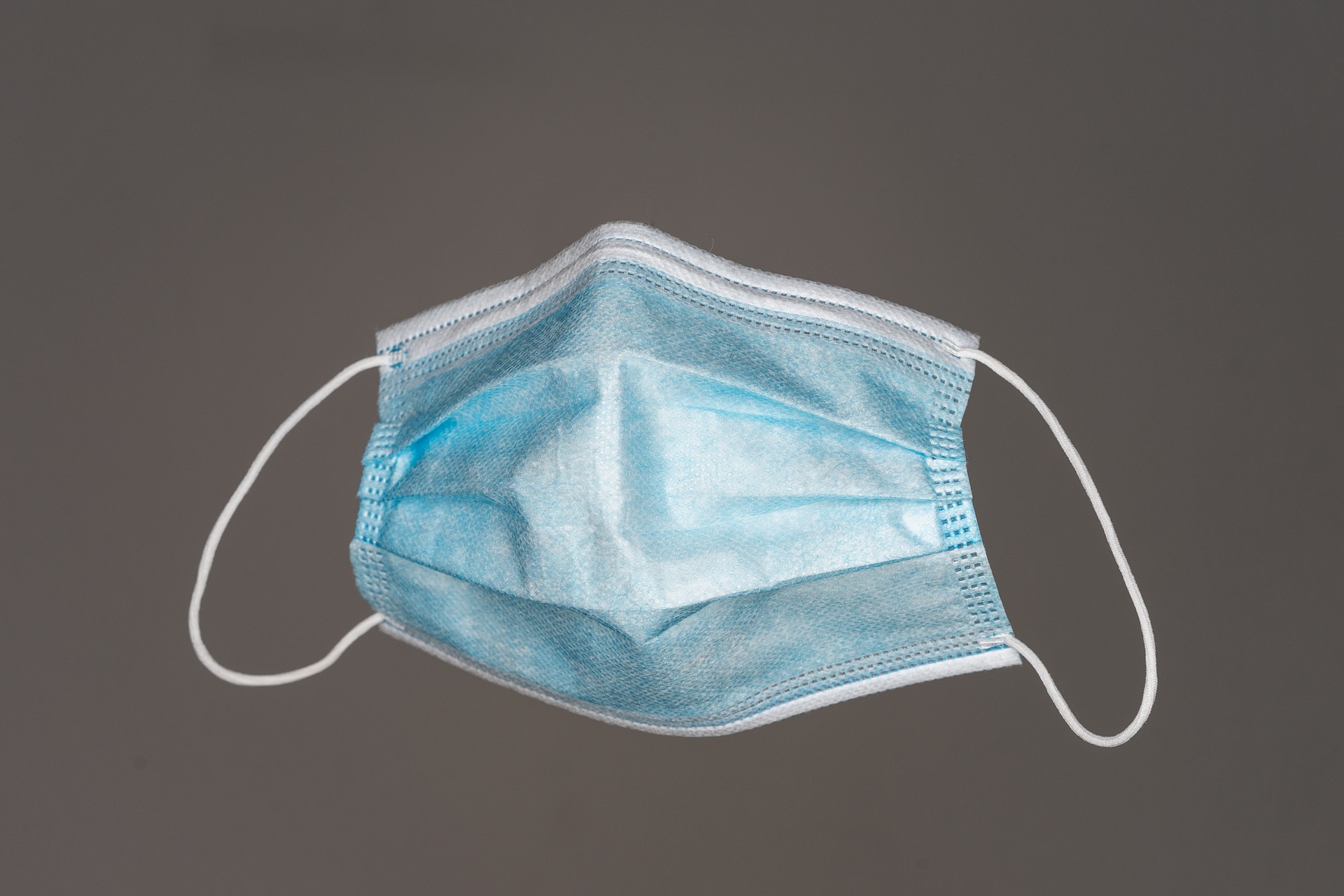Health Minister for Reorganising, Adapting to New Circumstances After Quake
ZAGREB, 2 January, 2021 - Health Minister Vili Beros said on Saturday the ministry's task was to reorganise healthcare in the wider area hit by Tuesday's devastating earthquake, adding that it was necessary to adjust to the new circumstances and transfer patients to hospitals in Zagreb to "receive the adequate assistance."
Speaking to the press while visiting the Sisak General Hospital, which sustained extensive damage, Beros thanked its staff for receiving 32 patients and conducting over 90 checkups since the tremor.
Petrinja hospital temporarily unusable
The minister said "unfortunately... the building of the hospital in Petrinja is temporarily unusable and can't be made functional quickly in any way."
He said enough rapid antigen tests for coronavirus had arrived in the quake-struck area. "Over 1,500 vaccine doses have been ensured. Given that new doses are arriving on a weekly basis, it's certain that we will adapt to the new conditions and that as many doses as necessary will be reallocated for this county."
Beros said he did not expect everyone there to be vaccinated but that he would appeal that as many people as possible did to prevent the epidemic from spreading. He added that it took three to four weeks to acquire immunity, underlining the importance of vaccinating people as soon as possible.
Emergency medical aid containers set up
The minister said containers for emergency medical aid were set up in Petrinja because the local hospital was demolished.
"We are adapting to the circumstances. The ministry has instructed all health centres and family doctors to adapt to the new circumstances," he said, adding that medicines would be delivered to people with chronic diseases who lost their homes.
The director of the Petrinja hospital, Tomislav Dujmenovic, asked the contractors building a new hospital building to resume their work as soon as possible, saying the new building would solve all their problems.
Croatian Healthcare Workers: Christmas's Forgotten Heroes?
December 28, 2020 – Amidst the difficulties of a second lockdown, a socially distanced Christmas and yet more earthquakes, have we forgotten about Croatian healthcare workers? TCN decided to interview a doctor working on the front line of the fight against COVID
During the first lockdown, it was all about the balconies. Saxophonists, DJs, opera singers – we were entertained on social media by a string of balcony-based stunts that somehow showed resilience, community spirit, humour. Zagreb was no exception. A trend of clapping on balconies in appreciation of healthcare workers passed from country to country and was picked up in Zagreb. After the applause finished, people went back inside. Nothing much had changed. It was a nice enough gesture.
Since the start of summer, no such applause has been heard. Perhaps the release from lockdown gave the signal that the lives of Croatian healthcare workers had also become much easier? That certainly wasn't the case. Though the number of people infected with COVID has grown significantly over recent weeks, Croatian healthcare workers have been treating people sick with COVID since springtime.
Croatian healthcare workers are currently busier with COVID patients than at any time before. And yet, there are no more trips out onto the balconies to show our appreciation for them. Perhaps it's now too cold outside? Perhaps some aren't aware how busy Croatian healthcare workers currently are with COVID patients? Are we perhaps guilty of taking Croatian healthcare workers for granted? Or, maybe we have simply put Croatian healthcare workers to the back of our minds as we struggle with our own challenges?
Throughout this year, TCN has been pleased to report many instances of generosity and innovation directed towards the fight against COVID. Certainly, not everyone in the country is guilty of forgetting about the Croatian healthcare workers who are on the front line fighting this disease. But, how much impact do these instances have on the general lives of Croatian healthcare workers? What is it like to no longer hear the nightly appreciation from our balconies? And, just what is life like as one of the many Croatian healthcare workers battling COVID in the year of the pandemic? TCN decided to interview one to find out.
The doctor we spoke with is a resident physician, working at a smaller community hospital in the continental part of Croatia. They agreed to speak with us on the condition that they do so anonymously.
Looking back at the first lockdown, we didn't know so much about COVID back then. We didn't know exactly how it was spread, the different manifestations of the disease, what course the disease took, nor what the recovery could be like. I think the government did a really good job of responding to the threat as they saw it. We had a small spike in cases, but that is minuscule to what we have now.
I think people generally did what they were told because they thought it would be temporary and they could see the sense in starving the disease out.
At the hospital, we were at first caught a little off guard with the amount of PPE we had and some other resources that we needed. For ICU and ventilators, we were well equipped.
Some of the residents were given some paid leave. It was important to put human resources into tiers. Croatian healthcare workers were certainly more predisposed to catching the disease, simply because they were around it every day.
After such great early successes, I was surprised that everything was relaxed later on to allow the tourist season to take place how it did, and for events like the Vukovar commemoration. It felt like it was a calculated risk. The lockdown we are now in is perhaps too little, too late. The disease is out there now, wild. The numbers of infected people are significantly higher.
The difficulty with this disease is that people can be infected and have very few or no symptoms at all. They might not know they are spreading the virus. You might not know you're sitting next to someone who has it.
Even though we're not at the centre of care for a major population area or city, we saw cases of the disease almost immediately. Our community hospital services an area containing around 150, 000 people. The first cases in April came from nursing homes – elderly, vulnerable people, many with pre-existing conditions. We were well equipped to handle it. Now, we are stretched on a daily basis. We fill the beds with sick people as soon as we empty them.
We wear masks and PPE all day, all the time. All Croatian healthcare workers in hospitals currently do this. Every patient who comes in, regardless of their symptoms, we treat them as though they are carrying the disease.
A lot of residents like me, who are working towards getting their specialty, go to do some periods of work in larger hospitals in the bigger cities. Now, many of those residents have been called back to their community hospitals – we are short on human resources.
The hospital has had to restructure itself significantly. Lots of doctors have been asked to provide cover in the emergency department. Over half of that area is now fully dedicated to COVID.
What do COVID patients look like in regards to their symptoms? It depends on their age and risk group, but you see people who look like they have flu or bacterial pneumonia, you see people who are in acute respiratory distress. Sometimes they have neurological changes, some of them look like they have had a stroke. Some people who have been infected and have supposedly got over the worst of the symptoms, come back in after a month or two with blood clotting problems – blood clots in the legs, which have a tendency to travel up to the lungs and cause a pulmonary embolism. That's a pretty big medical emergency. Some who have pre-existing heart conditions come in with a heart attack triggered by them catching COVID – it's more complicated trying to revive someone when you know they have COVID. The presentation of the disease is so variable.
It's not only older people. I've seen young people be admitted with serious reactions to COVID - young, healthy people who have no pre-existing conditions. I've seen young people come in with mild symptoms, they are sent home with antibiotics and steroids. That is the standard treatment – antibiotics to prevent a bacterial super-infection and steroids to prevent an acute reaction by the body's immune system to COVID. - that's what can cause big problems later on, in the course of the illness. But, sometimes that's not enough. I had a young patient just last week - super healthy, worked out regularly, no pre-existing conditions – and his lungs just looked awful. He had to go to the ICU immediately (sadly, this patient later died). That's like no disease I've ever seen before. Really, COVID is a completely new kind of animal.
The new strain of COVID? There is evidence that it can be spread more easily, and that it can affect more younger people, but there is no evidence that it is any more severe. The vaccines will work against it.
We're short on ventilators now. Really, we need two free ventilators at any time, in case there is an emergency admission. We are not currently in the position where we always have two free ventilators – sometimes they are all in use. That's a worry. I worked one shift where the anaesthesiologist said “We just don't have any more space for them – we will just have to put them in the hallway”. I've never seen that before.
I've heard of Croatian healthcare workers, colleagues in other hospitals getting sick with COVID and the hospital asks them to prove they got sick at work. It's pretty clear that's the most likely place they would have got sick because they're working with COVID patients. They were forced to be off work, but only on a lower level of sick pay. If you get ill because of being at work, you get full pay. But, they couldn't prove it, so they didn't get that.
I've been lucky – I haven't caught COVID yet. Well, as far as I know. My pay hasn't gone down, it's gone up – but only because I'm working so many double shifts. I volunteer to provide cover when other members of staff get sick. The specialists – the consultant doctors – they have it worse than us resident doctors. They are more responsible, so they are expected to work more hours. Nobody is pressured or threatened into picking up extra shifts, it's just something that almost all of us just do.
I've read some nice stories about fundraising efforts and donations to Croatian healthcare workers and hospitals in different parts of the country. Everything is appreciated. But, I personally haven't seen any effect of that on our day to day lives at work. Not at our hospital. Maybe there were PPE donations or cash donations, but it hasn't impacted the daily lives of me and the Croatian healthcare workers who are my colleagues. I think I heard that a local garage was giving free cups of coffee if you show your medical ID. Every little is appreciated.
For me and the Croatian healthcare workers who are my colleagues, instead of any kind of personal discounts or donations to staff, we would much prefer if people just took this disease more seriously. Things look very different when you work in a hospital compared to someone outside who maybe doesn't know anyone who got sick.
I came off a particularly difficult double shift a couple of months ago – it was just non-stop COVID admissions, some severe cases. As I was walking home, I walked past a bar that's near to the hospital. They had signs on the walls telling people to keep their distance. But, the bar was absolutely packed – full of young people. It just felt so disappointing. I couldn't help but think of the older relatives they would come in contact with, some who might get really sick.
Instead of people clapping on balconies, I think Croatian healthcare workers would just prefer more general vigilance and personal responsibility – wear your mask, wash your hands regularly, no more parties in the basement. Clapping on balconies is a nice gesture, but ultimately it's an empty one.
How does it feel to know that there are some people out there, in every country, all around the world, who believe COVID is a hoax, or a plot, or not so serious, or that the vaccine is dangerous or something other than what it is?
Well, it's not always the content of the conspiracy theory that appeals to these people as much as it is their inability to accept facts – the truth – because they have little faith in the authorities that are telling them this. Here in Croatia, I think that distrust is quite high – a lot of people are disillusioned with the state and politics, because of corruption. Sometimes over 50% of the population choose not to vote. The dissemination of misinformation over social media doesn't help - if that's where people get their news from. If you look at that example from your own country, where strict measures about movement were put in place by your government, and immediately afterward, the Chief Advisor to the Prime Minister, was caught breaking them to travel across the country with his family to a second home in the countryside, going out on day trips. And he was defended by his colleagues after he was found out! When people see those kinds of things happening, the distrust between people and the authorities just grows.
All of the images in this article are used as illustrations only. None of the places or people depicted are in Croatia or Croatian, except for the first image, a panorama of Zagreb
"We Can Stop Healthcare System Collapse, But We're Not Wanted Even During Pandemic"
November 20, 2020 - Petra has been waiting for her internship for a year now. She often meets Maja at the employment Bureau, who has been hoping for an internship for two years. Besides her, Petra sees hundreds of other colleagues who were once just like her, the best students of their generations. Despite the endless stories about there being a shortage of medical staff, these same healthcare workers are not being seen as essential to start work, even during the pandemic.
After graduating, they are required to complete a one-year internship, after which they receive a license with which they can be employed. It all seems fine, but internship places hardly open up, and when they do, they lack or some other set up has already been previously arranged.
"The internship can be cancelled," says Petra B., a medical laboratory diagnostician. "As it's a professional study, as part of the study, we're obliged to do a professional internship, that's over 500 hours in different types of laboratories." As such, during school alone, they get acquainted with the job and gain experience working in the laboratory.
Some of the bachelors in physiotherapy, occupational therapy, medical laboratory diagnostics, radiological technology, or sanitary engineering wait for an internship for up to two years, which means they have spent that period browsing on hospital and employment Bureau websites, just waiting for a vacancy. After graduation, many of them exercise their student rights and work for three months in shops, cafes, restaurants, and other places unrelated to their profession. When those three months pass, they're simply sentenced to sit and twiddle their thumbs at home. To get the right to an internship, they mustn't be employed outside of their profession, and it is mandatory to register yourself on the Croatian Employment Service's (CES) unemployment register.
The problem with internships is not only in regard to gaining experience, but that it isn't even possible - it's obligatory to do it, but hospitals aren't obliged to announce a tender and hire an intern. That is, no one guarantees them a time period in which they must wait, and when they can get started with work; months and even years can pass, leading to yet another burning problem - labour shortages.
Not everyone agrees with the abolition of internships, despite the many issues with it. Bachelor of Radiological Technology, Ana K., with all the hours of professional practice she now has under her belt, doesn't feel ready to enter the labour market with such responsibility. She believes that internships are a good experience and an excellent opportunity to learn and improve one's knowledge and skills.
"But, if it's obligatory, then it should be ensured that every person who finishes school automatically gets a place in a hospital and does that internship, and not just do it as it is done now - there are too few places for the number of graduates," says Ana. K., who, as an alternative, proposes shortening the length of service to give as many healthcare professionals as possible the opportunity.
The problem of obtaining an internship has existed for many years in Croatia. Still, as the demand for healthcare workers increases during the pandemic and even retirees are being called upon, bachelors are also waiting for a call, but it hasn't yet arrived. On the contrary, this year, the internship measure was completely suspended until the autumn when the quotas for healthcare professionals were adopted. The total quota for healthcare professionals is 170 employees, including 99 employees in hospitals, 50 employees in health centres, and 21 employees in the Institute of Public Health.
The CES recorded 1277 new unemployed people in the healthcare sector this year. If we take into account that the Medical Polytechnic in Zagreb alone enrolls about seven hundred students every year, it means that a similar number of them are waiting for an internship every single year, in addition to those who graduated in previous years and still haven't received an internship. In addition to Zagreb, health studies also exist in Varazdin, Osijek, Rijeka, Split, Bjelovar and Karlovac.
Physiotherapist Maja B., who has been waiting for her internship for two years now, is especially saddened that her profession is not considered useful even during the time of the pandemic. However, this situation prompted them to raise their voices so that the Ministry of Health could hear them.
"After numerous appearances in the media, interviews and sending letters to the Ministry, they finally remembered us and started with their 'mobilisation' and invited us to work in the Zagreb Arena, which is open as an additional capacity to receive those who are unwell,'' says Maja, who thinks it would be great if that work was recognised as an internship, regardless of its duration. "We help the state, save the healthcare system from collapsing, the state saves on salaries because they'd pay us for maybe 3-4 months, not for a year, and we'd be recognised for our experience much earlier than we would normally. It would be good for us, and also good for them,'' concludes Maja, although she is aware of the fact that this is difficult to achieve.
Although the Republic of Croatia is a member of the European Union, it hasn't abolished internships after college like other member states have. As a reminder, students have to do over 500 hours of practical work during their studies - not only at the faculty but also throughout hospital wards, nursing homes, laboratories, and in various other conditions. However, there is no internship for doctors of medicine and bachelors of nursing in the Republic of Croatia. The study of nursing is part of the Medical Polytechnic of Zagreb, as well as the previously listed fields that are required to complete an internship and earn a license. They are exempted from the internship due to their fifth year of high school, during which they acquire the necessary practical knowledge to start working.
Dissatisfied that the internship as an obligation was not secured, they launched a petition to cancel the internship, which has so far collected over 5,000 signatures. In addition to bachelors, the petition seeks to include scholars who have completed their education and are waiting to be registered at the CES, as well as the upcoming generations of students who have yet to complete their education.
When Petra's friends heard that she had enrolled in the field of healthcare, the reaction was more or less the same: "Good for you, you'll at least have a job." That was one of the reasons for her enrollment in this faculty. The same is true for most of her colleagues. "However, I didn't think that we still wouldn't be desirable even during a pandemic,'' concludes Petra B.
For the latest travel info, bookmark our main travel info article, which is updated daily.
Read the Croatian Travel Update in your language - now available in 24 languages.
Join the Total Croatia Travel INFO Viber community.
From Lovran to Zagreb: How Do Croatia's Hospitals Stand Financially?
As Novac/Frenki Lausic writes on the 4th of May, 2019, across 59 hospitals in Croatia, a total of 41,692 workers are employed, out of a total of 65,000 employees in the health care system, and the share of health workers in the total number of hospitals ranges from 70.1 percent in the Lovran Orthopedic Clinic, to 81.2 percent at the Clinical Hospital Centre in Zagreb.
From this data, it could easily be concluded that the hospital in Lovran operates poorly, as it has a large number of administrative staff who aren't directly involved in the care of patients, while KBC Zagreb is best placed financially because it has the least employees in administration. The reality is exactly the opposite: Lovran is the best Croatian medical institution financially, making it one of the ten major state hospitals operating without any losses, while KBC Zagreb has the biggest losses, the most obligations, and the most outstanding unpaid obligations.
However, data on the positive financial performance of hospitals may be correlated with the fact that the largest share of beds (in total capacity) is boasted by the clinic in Lovran, 82.61 percent, while OB Varaždin, one of the general hospitals with the worst business indicators, has the largest number of beds for long-term and chronic treatment, as well as palliative care (511 beds, or 49.18 percent of the total bed capacity of the hospital) due to the merging of the Novi Marof Hospital for Chronic Disease and the Hospital for Lung Diseases, and TBC Klenovnik OB Varaždin.
Therefore, the status and causes of success and failure in Croatia's hospitals need not be judged at first impression because each hospital is a special case for itself and requires a deeper analysis. However, there are also common denominators when it comes to the ''bad'' side of the Croatian hospital system, ranging from poor financial results, some bad patient outcomes, long waiting lists, and some institutions with literally horrible sanitation facilities.
In response to a survey conducted by Maja Vehovec, Ivana Rašić Bakarić and Sunčana Slijepčević, researchers from the Economics Institute back in 2012, which included one director of the Clinical Hospital Centre, three directors of general hospitals and two directors of special hospitals and representatives of the association of employers in the health system, it can be seen that when finances are in question, "the root cause of the problem with not paying costs is seen by directors as a continuous imbalance between the revenue received and the expense accounted for."
The basic part of the hospital's income is, in fact, the income that the hospital receives from HZZO, which are presented as the so-called "limits", ie, the annual budget funding which was introduced back in 1997.
For this reason, the authors point out that the limits to be allocated to hospitals should be based on objective indicators such as the number and types of surgeries, the number and type of outpatient examinations and the like, ie, the costs of each activity. The second management model in this part, based on the payment of the services provided, began being implemented back in 2015, at the time when Croatia was ruled by an SDP government, but such a practice was later stopped by the HDZ government, which returned the "limits" method the following year.
The Croatian Government and the Ministry of Health have decided to ''repair'' the situation this year by increasing their contributions to the healthcare system from 15 to 16.5 percent.
Make sure to follow our dedicated lifestyle page for more information on Croatia's healthcare system, hospitals in Croatia, the quality of treatment in Croatia and much more.
Click here for the original article by Frenki Lausic for Novac/Jutarnji
From the UAE to Zagreb and Croatia for Medical Treatment
For a long time now, we've been trying to show and tell people that Croatia is far, far more than just the sun and the sea. Sure, the sparkling Adriatic and the warm climate is of course a big draw for many who take to Croatia's beautiful coastline every summer, but those who think that's all that this incredible little country has to offer are sadly mistaken.
I'm not just talking about the more encouraging numbers of tourists starting to uncover continental Croatia, Eastern Croatia and the country's various hidden gems, but about the Croatia which lies outside of the tourism bubble entirely, well... almost.
Tourism makes up a large part of Croatia's GDP and there's no denying that it is by far the country's strongest economic branch, this is not always a particularly positive thing and owing to it, Croatia has been plagued by enormous seasonality in terms of the economy and the labour market. Unemployment traditionally drops quite suddenly and by a significant amount during the run up to the bustling summer tourist season, especially on the coast, and then rises once again come the end of October thanks to the attempted lengthening of the tourist season, if not before.
Now a victim to a demographic crisis, mass emigration thanks to the country's membership of the EU's single market and a strange paradox in which there are no jobs but plenty of would-be employees but also many jobs and nobody who wants to do them, it's becoming more and more obvious that despite it being the country's strongest economic branch, relying almost entirely on tourist money might not be the best plan.
So, what else does Croatia have? It has some excellent doctors and nurses and many truly outstanding medical facilities. As Croatia tries to position itself as much more than ''just sea and sunshine'', medical tourism, or perhaps better to say ''health tourism'' has begun to take off, and with some promising results. Just recently, Donald Trump's first wife, Ivana, was in Zagreb for eye surgery at the well known Svjetlost clinic, where she underwent a procedure to restore her vision to normality and afford her a life without glasses and/or contact lenses. People like Ivana catch people's attention, and she's just one of many who have found their way to Croatia for a procedure of some sort.
As Poslovni Dnevnik/Marija Crnjak writes on the 29th of April, 2019, tourists from the United Arab Emirates (UAE) are increasingly travelling to Croatia and love luxury hotels and villas, and the Croatian National Tourist Board (HTZ) is set to present Croatia's rich tourist offer at the ATM Arabian Travel Market in Dubai on May the 1st, 2019.
In the scope of the above, HTZ Director Kristjan Staničić met with media and partners such as WEGO, Medical Ozone, AVIAREPS, Jordan's Tourism Organization, Meetin and Think Strawberries.
"Presenting Croatia on this market and cooperation with the UAE has multiple effects for Croatian tourism and for the economy, and the direct air link between Zagreb and Dubai with Emirates has led to an increased demand from business travellers, as well as tourists from East Asian countries such as South Korea, Japan, Taiwan, Singapore and then even Australia,'' he said.
There are also high expectations from the new Fly Dubai line, which will link Dubrovnik and Dubai from June the 2nd to October the 13th.
Citizens of the UAE realised 25.5 thousand overnight stays in Croatia last year, and most of them came to Zagreb, Dubrovnik and Split. They are typically demanding guests who love a touch of luxury and are travelling more and more.
In addition to HTZ, there are seven co-exhibitors, TZ Zagreb, TZ Dubrovnik-Neretva County, NP Plitvice Lakes, HUP, Amathus Travel Croatia, Abacus Tours and Jung Sky.
Zagreb will be presented in Dubai as a city break, as well as a health tourism destination.
Make sure to follow our dedicated travel and lifestyle pages for much more. If it's just the Croatian capital you're interested in, give Total Zagreb a follow or check out Zagreb in a Page. Find out more about Croatia's blossoming health tourism story, as well as the health system in general, here.
Click here for the original article by Marija Crnjak for Poslovni Dnevnik
PBZ Donations Help Čakovec County Hospital Continue Praiseworthy Mission
With this project, PBZ Group collected more than 14 million kuna and realised 36 donations.
Alcohol and Tobacco Prices Have Risen by More Than 100% in Last 20 Years
While the price of alcohol and cigarettes have shot up, costs relating to the healthcare service have increased alongside them.
Production of Teeth From Zirconium and Titanium in Zagreb Returns Smiles to Patients
Owing to top care and lower prices, Croatia is quickly finding its place as a popular dental and medical tourism destination.


